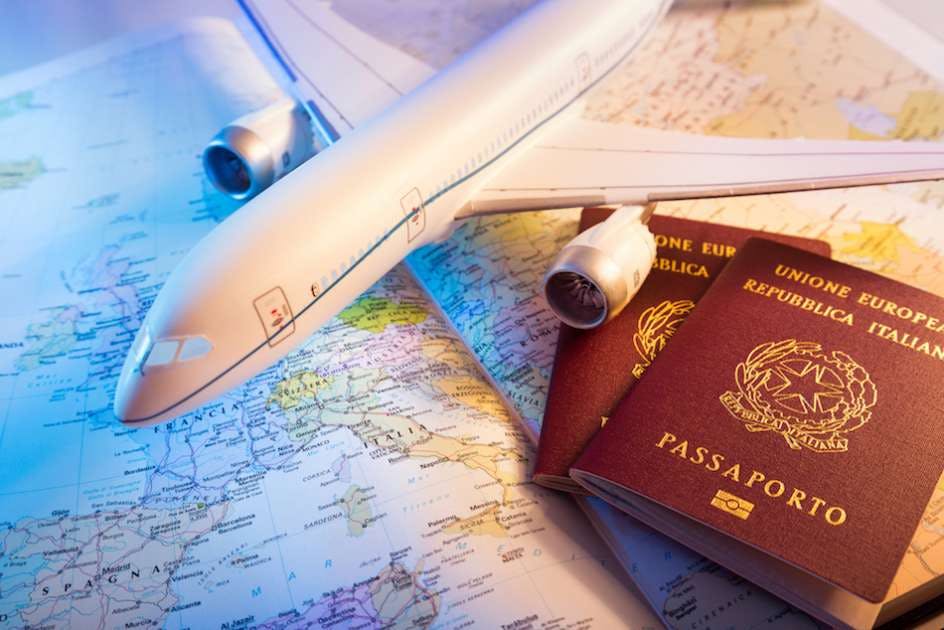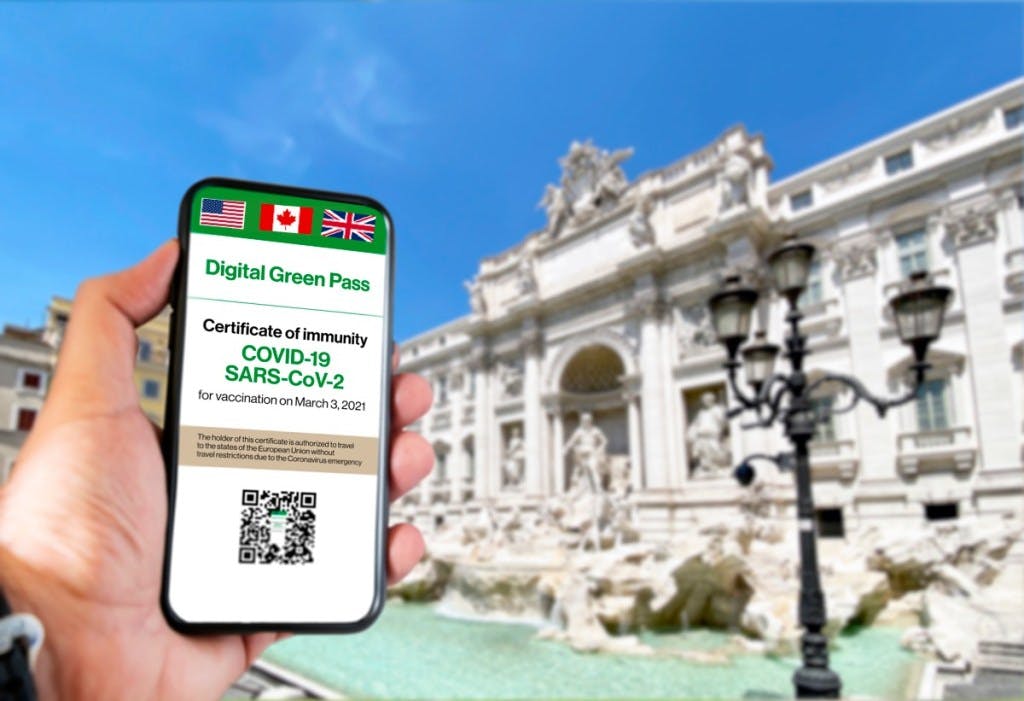
from our website Italy Green Pass
Updated January 24, 2021
Planning travel to Italy right now can feel overwhelming because although tourism is permitted from specific countries, there are several requirements, including the Italy Green Pass, that travelers must observe.
Here at ItaliaPass, we've gathered information for you on the questions our community members are asking most frequently right now about the Italy green pass and other restrictions. We work hard to keep this information up to date as the situation changes and evolves; however, we advise you to double check with local government authorities regarding your specific itinerary prior to booking and travel.
Here's what you'll find in this article:
- Can I travel to Italy now?
- What is required to enter Italy?
- What is the color-coded zone system in Italy?
- What is the current health situation in Italy?
- What is the EU and Italian green pass?
- Where can I find the most up-to-date information in English from the Italian government?
Can I travel to Italy now?
Italy is accepting incoming citizens and residents of the US, Canada, the UK, EU countries, the Schengen area and others.
Entry requirements vary based on where you're coming from. You can find the specific entry requirements from your country by clicking here.
What is required for tourists to enter Italy?
Here are the requirements for entering Italy for three non-EU countries that many of our ItaliaPass community members travel from:
United States and Canada
No quarantine necessary upon arrival if the following requirements are met:
- Complete the Passenger Locator Form before entering Italy.
- Present a certificate from US or Canadian health authorities that certifies one of the following:
- complete vaccination against COVID-19 at least 14 days prior to entry with a vaccine approved by the European Medicines Agency (Pfizer/Comirnaty, Moderna/Spikevax, AstraZeneca/Vaxzevria, Janssen/Johnson & Johnson);
-OR- - successful recovery (certificate valid in Italy for six months from the start date indicated on the certificate).
- complete vaccination against COVID-19 at least 14 days prior to entry with a vaccine approved by the European Medicines Agency (Pfizer/Comirnaty, Moderna/Spikevax, AstraZeneca/Vaxzevria, Janssen/Johnson & Johnson);
- Present proof of a negative result from an antigen test performed within 24 hours prior to entry in Italy or a molecular test performed within 72 hours prior to entry (children under age 6 exempt).
United Kingdom
No quarantine necessary upon arrival if the following requirements are met:
- Complete the Passenger Locator Form before entering Italy.
- Present a certificate from UK health authorities that certifies complete vaccination against COVID-19 at least 14 days prior to entry with a vaccine approved by the European Medicines Agency (Pfizer/Comirnaty, Moderna/Spikevax, AstraZeneca/Vaxzevria, Janssen/Johnson & Johnson), or EU Green Pass proving the same;
- Present proof of a negative result from an antigen test performed within 24 hours prior to entering Italy or a molecular test within 48 hours prior to entering Italy (children under age 6 exempt).
What is the color-coded zone system for travel in Italy?
Italy developed a system of four colored zones—red, orange, yellow and white—to manage restrictions based on the rate of COVID infections. The zones are applied by region, and restrictions change based on the color of each region.
What is the current health situation in Italy?
Currently, there are five regions classified as orange zones: Abruzzo, Friuli Venezia Giulia, Piedmont, Sicily, Valle Aosta.
There are 13 areas classified as yellow zones: the regions of Calabria, Campania, Emilia Romagna, Lazio, Liguria, Lombardy, Marche, Puglia, Sardinia, Tuscany, and Veneto; and the autonomous provinces of Bolzano and Trento (Trentino).
The rest of Italy is currently classified as a white zone (Basilicata, Molise, Umbria).
In white zone regions, you are required to:
- maintain social distancing
- wear face masks indoors (and outdoors until January 31, 2022)
- for everyone age 12 and over, show a COVID-19 green pass (proof of vaccination, proof of recovery from Covid within past six months, or proof of negative Covid test within past 48 hours) for access to the following activities: local public transport, domestic air travel, train travel, ferries, regional buses, entry to museums, cultural sites, pools, gyms, wellness centers/spas, and some other activities (see chart);
- during the period from December 6, 2021 to March 31, 2022, show a COVID-19 super green pass (proof of vaccination cycle completed within past nine months or proof of recovery from Covid within past six months) for access to indoor dining at bars and restaurants, theatre, cinema, sporting events (see chart for more details).
A green pass is not required for access to shops (with some exceptions for malls in orange zones) and grocery stores.
In yellow zone regions, the above requirements are in place, plus face masks are also required outdoors. There are additional limitations on the number of participants at concerts, sporting events, theatre performances and cinemas.
For more information see our article What is the current health situation in Italy? on Italy Green Pass.

What is the EU Digital COVID Certificate? What is Italy's green pass?
The EU Digital COVID Certificate is issued to EU citizens and residents as digital proof of one of the following criteria:
- vaccinated against COVID-19 -OR-
- received a negative test result within the last 48 hours -OR-
- recovered from COVID-19 within the past 180 days (recovery certificate not in Italian must be accompanied by a sworn translation).
Health authorities in each EU country are responsible for issuing their own equivalent of the EU Digital COVID Certificate to their citizens and residents.
Italy does not issue EU Digital COVID Certificates, aka green passes, to citizens or residents of other countries.
However, it does accept as a green pass equivalent proof of one of the above criteria issued from a country's health authorities. For vaccinated travelers, these include:
- United States—CDC vaccination card
- Canada—proof-of-immunization card from provincial health authority (also commonly referred to as "vaccine passport")
- Britain—NHS vaccination certificate
Where can I find the most up-to-date information in English about traveling in Italy?
The best sources to check for current information about travel in Italy are your country's embassy in Italy and the Italian authorities' websites in English regarding travel.
Here are some of those resources in brief:
United States
Are U.S. citizens permitted to enter? Yes. Beginning on December 16, 2021 and valid until January 31, 2022, travelers from the United States may enter Italy if:
- they present a negative molecular PCR test result carried out within 72 hours of arrival or a rapid antigen test result carried out within 24 hours of arrival AND one of the following:
- an anti-COVID 19 vaccination certificate for an European Medicines Agency (EMA)-recognized vaccine. At present, EMA recognizes the following vaccines: Pfizer-BioNtech, Moderna, Johnson and Johnson, and AstraZeneca. The date of the final vaccine dose must be at least 14 days prior to travel. Travelers vaccinated in the United States can prove this via the “white card” bearing the CDC logo.
OR - A medical certificate confirming recovery from COVID dated no more than six months before departure.
Passengers unable to present a valid vaccination or recovery certificate will have to self-isolate on arrival for five days and undergo a molecular PCR or rapid antigen test at the end of the isolation.
- US Centers for Disease Control and Prevention (CDC) COVID-19 in Italy
See recommendations for fully vaccinated travelers.
See recommendations for unvaccinated travelers.
Canada
Travelers arriving from Canada are presently allowed entry to Italy, if certain specific criteria are met. You should not depend on the Government of Canada for assistance related to changes to your travel plans. To learn more about entry criteria and to verify if you can enter Italy, contact the Embassy of Italy in Canada to ask if you may be allowed entry, based on your individual circumstances and your itinerary.
Britain
The Foreign, Commonwealth and Development Office (FCDO) advises against all but essential travel to the whole of Italy based on the current assessment of COVID-19 risks.
Italian authorities
Italian National Tourism Board COVID-19 Updates: Information for Tourists
Italian Foreign Ministry COVID-19 Information for Foreigners in Italy
Italian Health Ministry COVID-19 Information for Travelers to Italy

